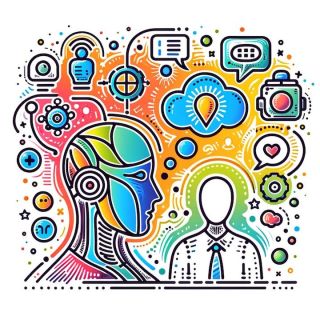Artificial Intelligence
I Think, Therefore I Collaborate
Personal Perspective: The allure of conversational AI.
Posted March 13, 2024 Reviewed by Kaja Perina
Key points
- Conversational AI enables natural, emotional human-machine communication.
- This AI unlocks new levels of human-AI collaboration across business and social sectors.
- It acts as an intuitive "brain interface" bridging human and machine intelligence.

There's something new afoot and it's a game-changer. Beyond AI and even the Large Language Models, the very nature of our engagement with technology is changing. Say hello to conversational AI. Thanks to advanced language models like Claude 3 and ChatGPT, we're on the cusp of a major shift—one that could transform everything from education and healthcare to customer service and beyond. Simply put, AI is getting a voice.
The Rise of the Emotionally Intelligent Machine
At the heart of this shift is a simple but profound idea: that machines can engage with us on a level that feels natural, intuitive, and emotionally resonant. By leveraging the power of natural language processing and machine learning, conversational AI systems like are able to understand and respond to human communication in ways that feel authentic, empathetic, and deeply personal. And while this task have been on the radar for many years, we seem to at a proverbial inflection point and I believe the implications will ripple across both technology and humanity.
This represents a significant departure from the rigid, robotic interactions that have characterized much of our previous experience with AI. Instead of being limited to predetermined sets of commands or queries, we can now engage with machines in much the same way we would with another human being—expressing ideas, exploring emotions, and building meaningful relationships.
A New Era of Collaboration
So what does this mean for the future of human-AI interaction? In short, it opens up a world of exciting possibilities for collaboration and co-creation. Imagine a scenario where every student has access to a highly knowledgeable, endlessly patient, and emotionally attuned AI tutor. Or where patients can rely on a friendly, supportive AI companion to help them navigate the complexities of the healthcare system or learn about a disease with the simplicity and compassion uniquely crafted for the user.
In the business world, conversational AI could transform the way companies interact with their customers, fostering deeper levels of trust, loyalty, and understanding. And in fields like scientific research and creative problem-solving, human and artificial minds could work together in ever-closer harmony, leveraging their unique strengths and compensating for each other's weaknesses.
Bridging the Digital Divide
But perhaps the most exciting aspect of conversational AI is its potential to serve as a kind of "brain interface" between humans and machines. By engaging with us on a level that feels intuitive and emotionally resonant, systems like Claude and ChatGPT are creating a bridge across the digital divide, allowing us to communicate with them in a way that feels truly meaningful and authentic.
This represents a significant shift in our understanding of what artificial intelligence can be and do. No longer are we dealing with mere tools or servants, but with something much closer to true partners in our intellectual and emotional lives. As these systems continue to evolve and improve, the boundaries between artificial and natural intelligence may begin to blur, leading to new forms of hybrid cognition that we can scarcely imagine.
Challenges and Opportunities
Of course, as with any transformative technology, there are challenges and risks to consider. How do we ensure that conversational AI systems are developed and deployed in an responsible manner? How do we navigate the complex social and psychological implications of forming deep, emotionally resonant bonds with artificial minds? After all, the power of AI's superhuman persuasion can emerge as one of its greatest tools—for better or worse.
I believe that conversational AI represents a major turning point in the history of human-machine interaction. By engaging with us on a level that feels natural, intuitive, and emotionally resonant, systems are opening up a world of possibilities for collaboration, co-creation, and mutual understanding. Whether we're talking about education, healthcare, business, or any other domain of human endeavor, the potential impact of conversational AI is truly staggering—and its at hand.


